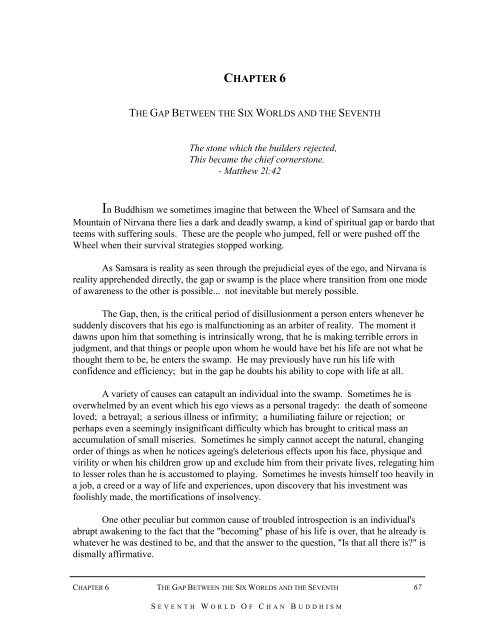seventh world of chan buddhism - Zen Buddhist Order of Hsu Yun
seventh world of chan buddhism - Zen Buddhist Order of Hsu Yun
seventh world of chan buddhism - Zen Buddhist Order of Hsu Yun
Create successful ePaper yourself
Turn your PDF publications into a flip-book with our unique Google optimized e-Paper software.
CHAPTER 6<br />
THE GAP BETWEEN THE SIX WORLDS AND THE SEVENTH<br />
The stone which the builders rejected,<br />
This became the chief cornerstone.<br />
- Matthew 2l:42<br />
In Buddhism we sometimes imagine that between the Wheel <strong>of</strong> Samsara and the<br />
Mountain <strong>of</strong> Nirvana there lies a dark and deadly swamp, a kind <strong>of</strong> spiritual gap or bardo that<br />
teems with suffering souls. These are the people who jumped, fell or were pushed <strong>of</strong>f the<br />
Wheel when their survival strategies stopped working.<br />
As Samsara is reality as seen through the prejudicial eyes <strong>of</strong> the ego, and Nirvana is<br />
reality apprehended directly, the gap or swamp is the place where transition from one mode<br />
<strong>of</strong> awareness to the other is possible... not inevitable but merely possible.<br />
The Gap, then, is the critical period <strong>of</strong> disillusionment a person enters whenever he<br />
suddenly discovers that his ego is malfunctioning as an arbiter <strong>of</strong> reality. The moment it<br />
dawns upon him that something is intrinsically wrong, that he is making terrible errors in<br />
judgment, and that things or people upon whom he would have bet his life are not what he<br />
thought them to be, he enters the swamp. He may previously have run his life with<br />
confidence and efficiency; but in the gap he doubts his ability to cope with life at all.<br />
A variety <strong>of</strong> causes can catapult an individual into the swamp. Sometimes he is<br />
overwhelmed by an event which his ego views as a personal tragedy: the death <strong>of</strong> someone<br />
loved; a betrayal; a serious illness or infirmity; a humiliating failure or rejection; or<br />
perhaps even a seemingly insignificant difficulty which has brought to critical mass an<br />
accumulation <strong>of</strong> small miseries. Sometimes he simply cannot accept the natural, <strong>chan</strong>ging<br />
order <strong>of</strong> things as when he notices ageing's deleterious effects upon his face, physique and<br />
virility or when his children grow up and exclude him from their private lives, relegating him<br />
to lesser roles than he is accustomed to playing. Sometimes he invests himself too heavily in<br />
a job, a creed or a way <strong>of</strong> life and experiences, upon discovery that his investment was<br />
foolishly made, the mortifications <strong>of</strong> insolvency.<br />
One other peculiar but common cause <strong>of</strong> troubled introspection is an individual's<br />
abrupt awakening to the fact that the "becoming" phase <strong>of</strong> his life is over, that he already is<br />
whatever he was destined to be, and that the answer to the question, "Is that all there is?" is<br />
dismally affirmative.<br />
CHAPTER 6 THE GAP BETWEEN THE SIX WORLDS AND THE SEVENTH<br />
S EVENTH W ORLD O F C HAN B UDDHISM<br />
67


